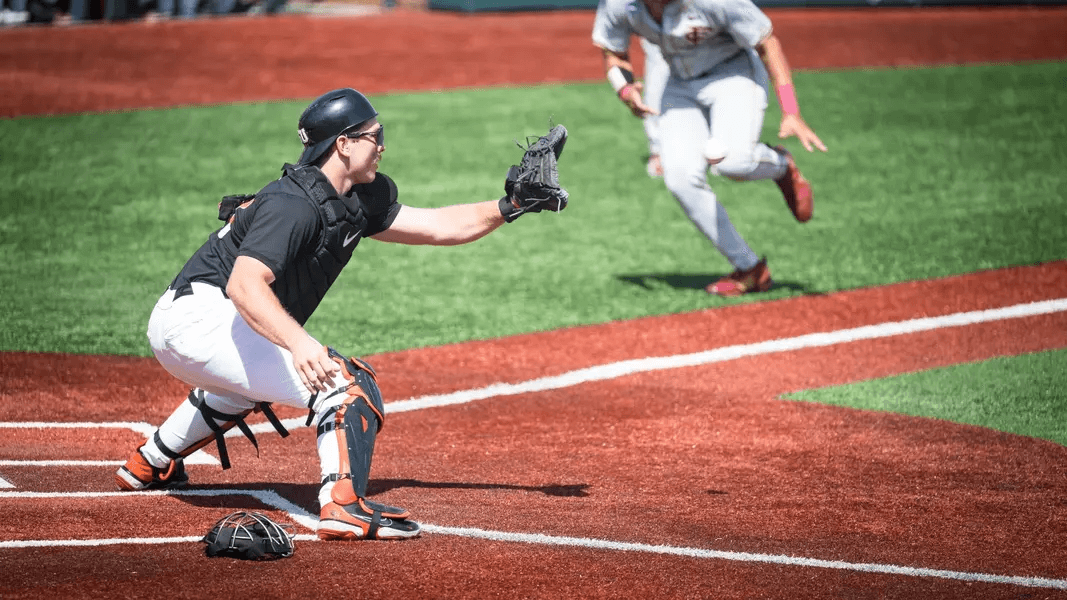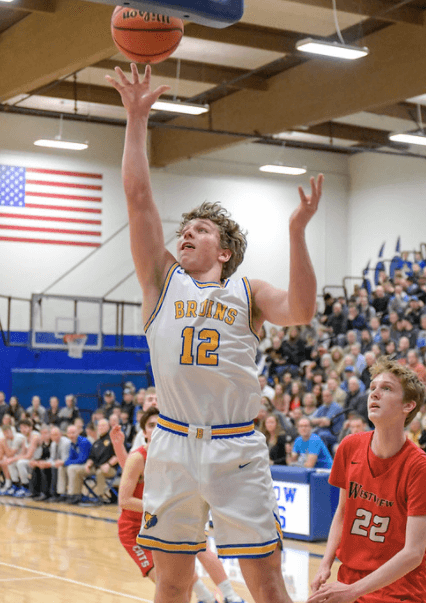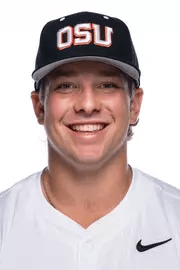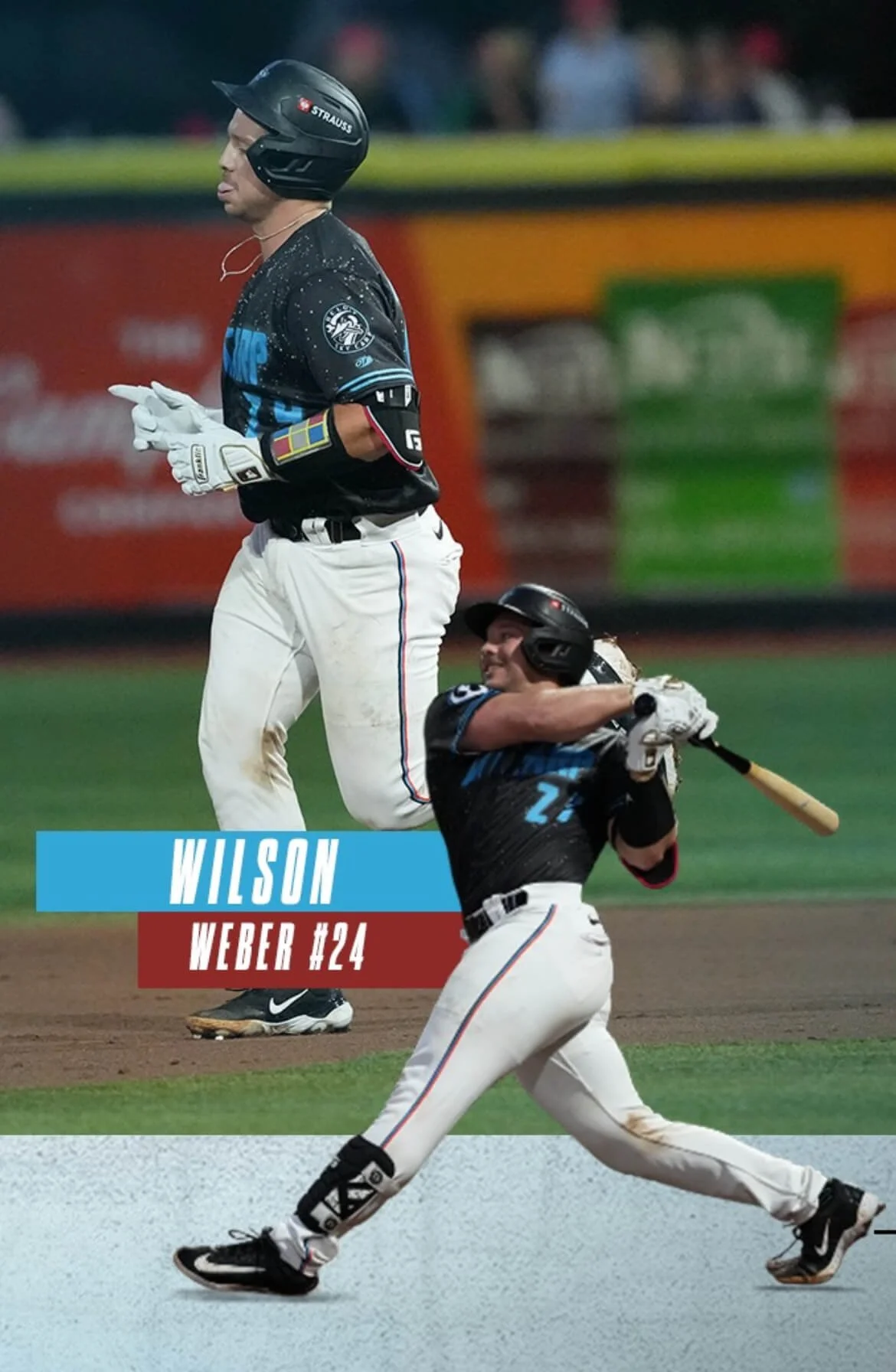Medal-winning Weber seeks to strike a big blow as a pro
Wilson Weber has begun his professional career in High-A ball at Beloit (Wisc.) (courtesy OSU sports communications)
Wilson Weber is appreciative and excited and grateful for the honor.
But the former Oregon State catcher has something to confess. He had never heard of the Tom Hansen Medal before this week.
And who is Tom Hansen?
The Tom Hansen Medal goes annually to one senior male and female athlete at each Pac-12 school, based on performance and achievement in athletics, scholarship and leadership. It has been awarded each academic year since 1960-61 and was named for Hansen after the former Pac-10/12 commissioner retired in 2009. This year, only athletes from Oregon State and Washington State received medals.
Weber, 23, is the Beavers’ male recipient. OSU’s female winner is Sara Sanders in track and field.
Recent male winners include football’s Jaydon Grant (2022-23), basketball’s Ethan Thompson (2020-21), Tres Tinkle (2019-20) and Stevie Thompson Jr. (2018-19), football’s Sean Mannion (2014-15), baseball’s Matt Boyd (2012-13), football’s Andy Levitre (2008-09) and Alexis Serna (2007-08) and — ta dum — baseball’s Mitch Canham (2006-07), Weber’s coach at Oregon State.
“Sweet,” Weber says in a phone conversation from Beloit, Wisc., where he has begun his professional career. “It is pretty cool to see my name in there with all of those greats.”
Weber graduated in June with a 3.61 grade-point average in business administration. He didn’t walk, however, with his fellow students at Reser Stadium. Weber was in Omaha, participating in the College World Series with the Beavers. Wilson and pitcher Chase Reynolds had their own observance in Omaha, with Weber’s parents, Ryan and Jessica, on hand to watch.
“It was a three-minute ceremony,” Weber says with a chuckle, “so it was perfect.”
Weber was previously recognized as the 2025 Pac-12 Baseball Scholar-Athlete of the Year and was a first-team Academic All-America selection by College Sports Communicators. He was also a semifinalist for the Buster Posey Award for college baseball’s top catcher this past season, hitting .326 with 15 doubles, 12 homers and 58 RBIs in 63 games.
Eighteen years ago, Canham was a Pac-10 Medal winner. Also a catcher, Mitch was a first-team All-American in helping lead the Beavers to their second of back-to-back College World Series championships. Weber didn’t follow suit with a national title, but he was a driving force in getting Canham’s Beavers to Omaha for the first time.
“There is no doubt he is extremely deserving of that award,” Canham says. “He is an incredible human being. He is a champion of everything. This is something that Case (former OSU coach Pat Casey) always talked about — be a champion at everything you do. That is Wilson.
“He takes care of it in the classroom, in the community. He is great with kids, (conversing and giving autographs) pregame and after games. He is great with his teammates, in the clubhouse. You give him a challenge, he goes out on the field and he takes care of it. What a great leader. He stayed in the program for four years and each year got better. It meant so much to him. Now he gets to play professional baseball — let’s go!”
Weber was a standout catcher at Barlow High. But Tom Johnson, the Bruins’ legendary basketball coach, remembers him for his contributions on the hardcourt. Wilson didn’t play his senior year because a shortened 2021 baseball season was offered in the fall, and he wanted to concentrate on that sport. “He would have been our best player as a senior,” Johnson says.
Weber was a swashbuckling 6-1 power forward for Barlow High as a junior in 2019-20 (courtesy Tom Johnson)
But Weber’s impact as a junior on Barlow’s 2019-20 season was major. It was one of the best Barlow teams Johnson has had in his 39 years as the program’s mentor. The Bruins won their final 15 games in a row and were a serious contender to claim the state 6A championship before the season was called off due to Covid the morning of the quarterfinals.
Johnson is well-acquainted with the Weber family. He coached Ryan Weber as well as Wilson’s two brothers, Stuart and Sam. “It is a really talented family,” Johnson says, “and Wilson is an exceptional athlete.”
Weber was the only junior starting that season on a 2019-20 team led by seniors Evan Inglesby and Jesse White. At 6-1, Weber was undersized to play power forward but made up for it with tenacity.
“Wilson had an incredible motor and was an absolutely fierce competitor,” says Johnson, second on the Oregon big schools’ coaching list with 711 victories over 42 seasons at Barlow and Lebanon. “He had the ability to play hard for so long and was a key factor for that team. He rebounded everything, took great pride in being a very good defender and did everything we asked of him. He understood his role well on a talented team.”
Johnson inserted Weber into the starting lineup “right before we began our 15-game win streak,” he says. “Wilson was a big part of that. He is a winner.”
► ◄
Weber improved every season at Oregon State, earning first-team All-America honors as a senior in 2025 (courtesy OSU sports communications)
Weber wasn’t an immediate hit at Oregon State.
As a 195-pound freshman in 2022, he played in one game and got two at-bats.
After adding 25 pounds during his first year in college, Weber hit .198 with three home runs in 24 games and 94 at-bats as a sophomore in 2023.
Dividing catching duties with Tanner Smith, Weber hit .276 with seven homers in 34 games and 137 at-bats as a junior in 2024.
Smith departed for Miami after the season. For a minute, Weber thought about declaring for the Major League Baseball draft. Then he thought better of it.
“I was going to be a senior (in 2025), and I was going to get more of an opportunity to play,” Weber says. “I knew I was going to have a chance to play every day rather than splitting time. Also, I love Oregon State and wanted to be there. I decided I wanted to go back and play every day and be a leader and serve the team and try to win a lot of games — to go to Omaha and try to win it all.”
There was an additional factor: The environment at Goss Stadium.
“I love Beaver Nation,” he says. “I wanted to be around one more year. My parents loved coming to games. I knew they would enjoy having one more season to watch. You never know how long life is going to be. You have to take advantage of the good things you have.”
It was a very good decision. Weber wouldn’t have gone high in the 2024 draft; he might not have been taken at all. Instead, he developed into a terrific two-way player, and his leadership skills proved critical as the Beavers went 48-16 and reached the College World Series as an independent.
“Wilson made a big jump,” Canham says. “We knew he had it in him. Sometimes it is that last year of development that guys need.”
Weber took it upon himself to go beyond just playing the game.
“He started to interview pitchers,” Canham says. “He had a notepad out there and he would be Q-and-A-ing one of the guys, and every day it would be someone different. He would spend time with them at breakfast. He wanted to get to know his teammates. Something he really wanted to work on was communication and being a great leader. He was huge in the clubhouse.”
Weber notched up defensively, too, with only four errors and five passed balls all season. He threw out 18 of 50 runners attempting to steal (36 percent).
“He has always had a great arm, but (this past season) he was playing more accurate catch,” Canham says. “Most of the time, he was on the money (with his throws). You saw how many times he tried back-picking runners at first base. That was huge in limiting (an opponent’s) run game.
“With the relationship he had with (Jacob) Krieg at first and the guys up the middle (Aiva Arquette at shortstop and AJ Singer at second base), everyone knew at any point in time, there could be an out, because Wilson was going to throw it or block the heck out of the ball. And he took mound visits. That was a big step, being the general on the field. We saw a lot more of that from him this year.”
Weber’s physical strength — he might have been the strongest player on the team — turned into power at the plate. His 12 homers and 58 RBIs were the second-most ever in a season by a Beaver catcher, short only of Adley Rutschman as a junior (17 homers) and a sophomore (81 RBIs). In the clutch, more often than not, he came through with a big hit.
“The guy has big-time slug,” Canham says. “He is one of the kindest people in the world, but he also learned how to unlock a different level of warrior when he was on the field.”
The season, Weber says, “went really well. We had a pretty good year and made it to Omaha, which was awesome. We came up a little short (of a title), but it was definitely a life-long memory, playing with all those guys. It was a fun squad, a good squad. I made a lot of good friends who I will have as friends forever. It was a special year, for sure.”
► ◄
OSU coach Mitch Canham says Weber could wind up having “a really long” pro career (courtesy Wilson Weber)
The Miami Marlins selected Weber in the 12th round of the July draft. He received a $100,000 signing bonus — not in the neighborhood of the franchise-record $7.15 million Arquette commanded from the Marlins after being the seventh all-around pick, but “enough to be happy about it,” says Weber, who has spent the past three weeks in Beloit, the Marlins’ High-A level farm club that plans in the Midwest League.
“It ended up being a blessing,” he says. “It is a good fit. I am where I am supposed to be.”
As luck would have it, Beloit is Oregon State central. Three Beaver teammates are teammates in Beloit — Arquette, Garret Forrester and Micah McDowell. Another OSU teammate, pitcher Aiden May, is rehabbing at the Marlins’ Low-A Jupiter affiliate after elbow surgery.
“It is special,” Weber says. “I am living with Micah now. Playing again with Garret is cool, too, and being with Aiva the last few weeks has been awesome.”
Weber had a six-week break between the end of Oregon State’s season in June and the date he reported in Beloit. His first game was on Aug. 6 with the Sky Carps, with whom he expects to play about 30 games before the end of the season. He has been splitting time at catcher with Forrester, who was a first baseman at Oregon State but is being converted to behind the plate. A third catcher, Connor Caskanette, has returned to the team after spending some time at Double-A Pensacola.
Defensively, “I feel like I am back in the groove, playing with a bunch of different moves catching-wise,” Weber says. “It is a different type of catching (than at OSU). It has been fun learning some new things and trying them out in a game. It is a different feel, for sure, going from college to pro ball.”
Through Tuesday action, Weber was hitting .220 with one homer in 11 games and 41 at-bats. He has company in his difficulty at the plate thus far from Forrester (.255, two homers in 59 games and 196 at-bats), Arquette (.237, one homer in 16 games and 59 at-bats) and
McDowell (.216 with no homers in 33 games and 102 at-bats). The league medium batting average this season is .249.
“I don’t feel horrible about the way I have hit,” Weber says. “It is a bit harder than college ball. I would like to have hit more homers, but anything from .220 to .280 is really good in this league. There are a lot more strikeouts, for sure. It is like facing every college team’s Friday night guy. It is something to get used to. There are some changes I need to make in the offseason. I am excited to work on it.”
Canham, who advanced as far as Triple-A in his nine-year minor-league career, believes Weber will be a success in pro ball.
“He is going to do great,” Canham says. “He has the skills to do it. He cares. Behind the dish, he is able to handle a variety of pitchers. I saw him handle guys with velo; I saw him handle guys with stuff. As a season goes on and he gets more comfortable, he starts to perform better and better. I could see him turning it on and having a really long career.”
► ◄
Weber intends to spend most of the offseason in Oregon, though he might make a trip with members of his draft class to the Dominican Republic, where the Marlins have a player development academy.
“It would be fun to go down there and train and experience (the Dominican) culture,” Weber says.
Weber will base at his parents’ home in Gresham, and would like to give lessons or participate in youth camps in the Portland area. He will also be in Corvallis “for weeks at a time to train, lift and do some lessons there.”
Deer hunting is also on Weber’s agenda.
“I will shoot some ducks with my Pops and my brothers,” he says. “(Former OSU teammates) Gavin Turley will be in Corvallis, and we will go out a couple of times, for sure.”
Asked what he will remember most about his time at Oregon State, Weber takes a moment to respond.
“Omaha is a pretty cool memory, but I don’t think I would say it was anything that happened on the field,” he says. “I will remember the road trips, the bus rides, hanging out with the guys. Those were some of the most fun times — BS-ing and playing music. Traveling with the guys, spending time off the field — those are my favorite memories, for sure.”
► ◄
Readers: what are your thoughts? I would love to hear them in the comments below. On the comments entry screen, only your name is required, your email address and website are optional, and may be left blank.
Follow me on X (formerly Twitter).
Like me on Facebook.
Find me on Instagram.




